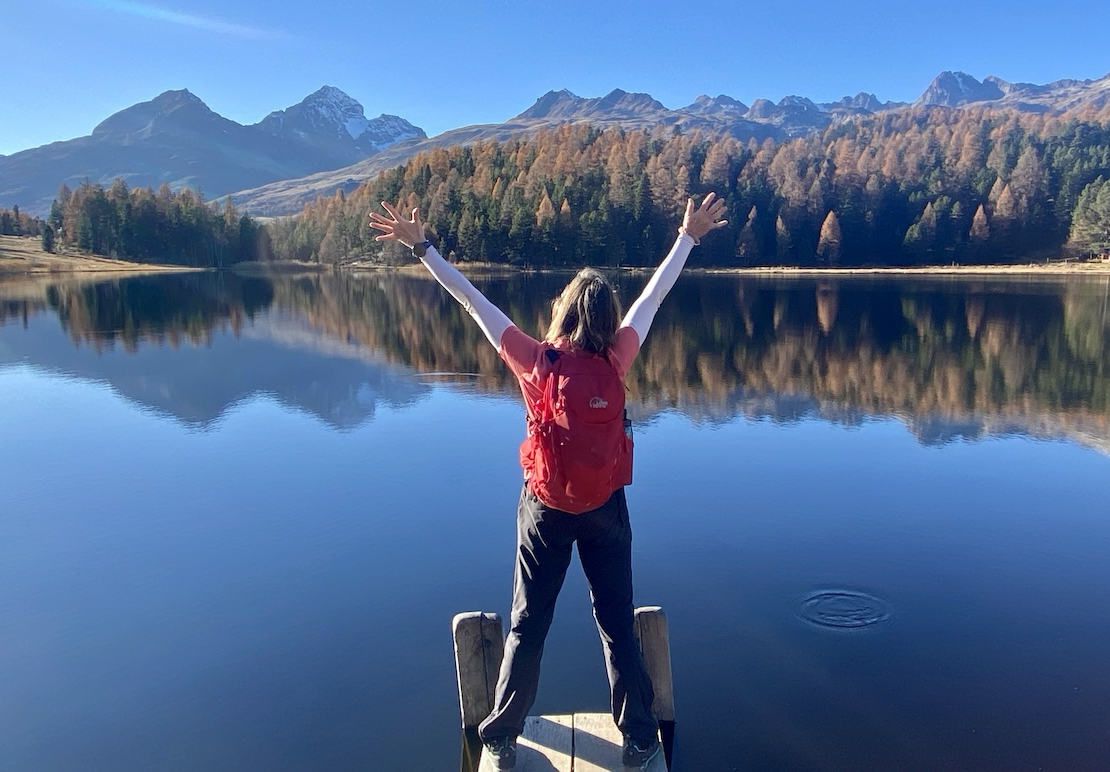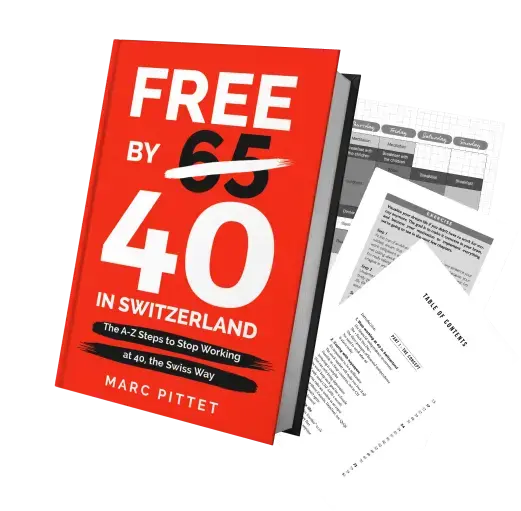(⬆️ the header picture is the evening view from our apartment in Zürich — yeah, we know, we are lucky and grateful for it!)
Hey there :) I’m Flo, a 35-year-old French woman living in Switzerland for the past 6+ years (Oct. 2017).
I’m working for Google in Zürich.
And I plan to retire at 40!
UPDATE 29.08.2024: Flo finally took the plunge sooner than expected :) The continuation of her story in this article.
Flo’s background story
Before arriving in Switzerland, I didn’t know anything about FIRE.
And at that time, I actually didn’t know exactly how much money I had in total. I only had a rough number in mind.
And because I always had a frugal lifestyle, and saved a lot of my income (between 60 and 70% usually), I never really paid attention to my expenses in general, because they were always low.
When I arrived in Zurich, having moved from Dublin, I changed my career ladder at work to a higher-paying role.
I got a substantial salary increase from my employer, and that’s when I realized I really needed to keep track of how much money I had and where I was financially speaking.
At that point, I was not investing any money on my own.
Since I was raised in a frugal “safe money” family, most of my net worth was sitting in savings accounts with various return rates (from 1.5 to 2.5%).
And until then, I had been pretty happy with that.
I should also mention I never had any debts (my parents paid for my studies) and I quickly got a job after graduating.
I also realized that my employer was matching my contributions to our company retirement plan, and was shocked when I discovered that after 4 years at Google, I had been contributing only the smallest amount (4.5%) instead of a full 8.5% — which my employer is matching.
I also had never logged into that account and had no idea how much money I had there at that point.
Finally, I knew that I was receiving company stocks, yet I had never logged into that account either and had no idea how much money that was worth.
Computing my net worth
At that point, I decided I needed to get a better overview of my personal finances.
First, I created a spreadsheet where I listed:
- The details of my annual income (gross salary + bonuses and stocks)
- ALL my accounts. It actually took me a while to access all of them, because, for many, I had lost the login information (or even had never logged in before, so I had to set all that up). I took advantage of that to download all the apps for these accounts, so that I could access the info more easily and regularly in the future. And that had been much needed! :D
While listing all my accounts, I did a couple of things:
- Checked the exact amount I had there
- Checked the interest rates
- Checked the fees and conditions! And that’s when I started moving a bit of money around to take advantage of best return accounts, and minimize banking fees. For example, my French bank was charging 10 euros per month, for money that was just sitting there, doing nothing — yikes!
- I set my retirement contributions to 8.5% (+8.5% employer match) to fully benefit from that. Because my lifestyle was so frugal, I didn’t really see any impact on my monthly paychecks.
- Finally, I also opened a 3rd pillar account (with a bank first 🤦🏻♀️, before moving to VIAC a year after)
My reasonable frugal lifestyle
Now, I also want to mention that while I manage to have a high savings rate (between 60 and 70%), I don’t live an extreme frugal lifestyle that some FIRE people may preach.
I live in a very nice and comfortable apartment.
I eat out whenever I want, and I treat myself when I feel like it.
I luckily just happen to have inexpensive tastes in general.
I hate shopping.
I am actually quite the minimalist, too.
And most of the activities I enjoy are usually mostly free — like hiking for example.
Discovering the FIRE movement
At that stage though, I still wasn’t aware of FIRE, nor was I investing.
But within 3 months of having moved to Switzerland, I met my partner Jan.
He happens to be 17 years older than I am.
And as we started talking about our future together, I realized that, if I wanted to enjoy the best of our lives together, I would have to retire much earlier.
I noticed: if I retire at the regular retirement age, Jan would be close to 80 years old.
What kind of activities would we do then?
And that’s really when I jumped and fell into the FIRE (Financial Independence, Retire Early) rabbit hole, and discovered the various ways to retire early.
I started to expand my spreadsheet with multiple formulas to calculate my FIRE target and then visualized the growth of my net worth and its forecast at different ages for potential retirement.
That’s when it really hit me…
Savings accounts would never get me there.
Hello Investing! (incl. our investment portfolio)
Jan, fortunately, had experience investing on the stock market with Interactive Brokers (and IB kept being recommended here and there), I started small and invested my first CHF 20'000.
From the very beginning, I only invest in ETFs.
I had learned from all the FIRE blogs that they were the go-to instruments for the ideal FIRE investment portfolio.
And as I am quite a risk-averse person, the diversification the ETFs provide really attracted me.
Also, I am quite a lazy person, so the full notion of passive investing in a set portfolio of ETFs really seemed the best option for me.
6 months passed by and I felt more comfortable with the market’s ups and downs. So I decided to invest a bit more.
Last year was actually a great year to start investing!
And now, approximately 70% of my net worth is invested (including my company’s shares).
It took me quite a while to build my portfolio, and I actually changed its composition last year to something that now fits my needs, values, and understanding of fees, taxes, etc.
I know the blog totally loves it when people share information like this! So, just scroll down a bit, and you’ll find all the juicy details about my portfolio and how it’s divided up:
| ETF name | Ticker | Portfolio allocation |
|---|---|---|
| iShares Global Government Bond UCITS ETF USD (Dist) | SWX:IGLO | 15% |
| Vanguard FTSE All-World UCITS ETF Distributing | SWX:VWRL | 40% |
| Vanguard S&P 500 UCITS ETF | SWX:VUSA | 30% |
| iShares MSCI EM UCITS ETF EUR | IQQE | 6% |
| iShares Developed Markets Property Yield UCITS ETF | IQQ6 | 6% |
| Vanguard Mega Cap Growth Index Fund ETF USD | MGK | 3% |
| Alphabet Inc Class C (my Google stocks) | NASDAQ:GOOG | n/a |
As you can see, at first I was super focused, and then I expanded my selection a bit 🙄 and I know that I got quite some overlap now with VWRL and VUSA…
The evolution of my salary over the years
I think it’s very important to share these numbers in general!
I see it as inspiring, even if it feels a bit like voyeurism :)
I’m sharing the gross annual salary here because taxes vary from country to country. This sum includes, before taxes:
- Salary
- Annual bonus
- Equity
| Year | Gross annual salary |
|---|---|
| 2012 | 30k € |
| 2013 | 33k € |
| 2014 | 37k € |
| 2015 | 66k € |
| 2016 | 86k € |
| 2017 | 123k CHF |
| 2018 | 161k CHF |
| 2019 | 192k CHF |
| 2020 | 210k CHF |
| 2021 | 240k CHF |
| 2022 | 264k CHF |
| 2023 | 297k CHF |
And below, I added some info on promotions, location, and job changes to contextualize the salary evolution.
And I added an approximation of rents for each stage, as this is always a big expense bucket, and can give context in regards to cost of living and lifestyle inflation.
Jan 2012 - Jun 2013
- Job: Communication Manager
- Company: for a small construction company (first “real job” after college’s Master degree)
- Country: Belgium
- Salary: 30k euros / year
- Lifestyle: living in the North of France (40-minute commute to work one way, as I was living close to the border). Rent ~ 500 euros/month (I was living with my sister at the time)
- Financial: at that time, I had about 10 months of expenses in my savings (full net worth) when I moved to Dublin in June 2013
- Career: I decided to quit my job, pack my things and move to Ireland in the summer of 2013, without any plans — no housing, no job, and I had never been to Ireland before / didn’t know anyone there. It took me 3 months to find a job (see below)
Oct 2013 - May 2014
- Job: Policy Analyst (not employed as a full-time employee at the time)
- Company: Google
- Country: Ireland
- Salary: 33k euros / year
- Lifestyle: at the time, I was living in a shared apartment in Dublin. ~700 euros/month
- Career: I got hired as a full-time employee with Google in May 2014
May 2014 - Nov 2015
- Job: Policy Analyst (Level 2 Full-Time Employee)
- Company: Google
- Country: Ireland
- Salary:
- 2014 = 37k euros (no bonus that year)
- 2015 = 66k euros
- Lifestyle: that’s when I moved to an apartment on my own. ~1100 euros/month
- Career: I got promoted to Level 3 Policy Specialist in 2015
Nov 2015 - Oct 2017
- Job: Policy Analyst (Level 3 Full-Time Employee)
- Company: Google
- Country: Ireland / Switzerland
- Salary:
- 2016 = 86k euros
- 2017 (partially Ireland / Switzerland) = 123k euros
- Lifestyle: I moved alone into a flat in October 2017 (Rent: 2500 CHF / month), and then met my partner and moved in with him in October 2018 (Rent: 1500 CHF / month)
- Career: in October 2017, I moved to Switzerland AND changed career ladder to become a Program Manager (which is a completely different career path in Google, and also a higher paying one than the Policy Specialist one)
Oct 2017 - Oct 2018
- Job: Program Manager (Level 3 Full-Time Employee)
- Company: Google
- Country: Switzerland
- Salary:
- 2018 (Swiss salary — switching to CHF) = 161k CHF
- Career: I got promoted to Level 4 Program Manager in 2018
Oct 2018 - April 2021
- Job: Program Manager (Level 4 Full-Time Employee)
- Company: Google
- Country: Switzerland
- Salary:
- 2019 = 192k CHF
- 2020 = 210k CHF
- Career: I got promoted to Level 5 Program Manager in 2021
April 2021 - April 2023
- Job: Program Manager (Level 5 Full-Time Employee)
- Company: Google
- Country: Switzerland
- Salary:
- 2021 = 240k CHF
- 2022 = 264k CHF
- Career: I got promoted to Level 6 Program Manager in 2023
April 2023 - today
- Job: Program Manager (Level 6 Full-Time Employee)
- Company: Google
- Country: Switzerland
- Salary:
- 2023 = 297k CHF
My net worth evolution in Switzerland
2017 was when I moved to Switzerland.
And it is the 1st year I tracked down all my numbers and calculated my net worth, hence I don’t have figures to share for previous years…
| Year | Net worth CHF | Investments CHF | Comments |
|---|---|---|---|
| 2017 | 167'557 | 42'193 | Mostly Google stocks from work |
| 2018 | 272'288 | 78'580 | Started investing a bit outside of my Google stocks |
| 2019 | 414'031 | 153'913 | Started feeling more comfortable with investing |
| 2020 | 571'671 | 254'059 | |
| 2021 | 874'505 | 525'052 | |
| 2022 | 863'936 | 559'881 | |
| 2023 | 1'061'961 | 731'197 | Made it to 1 Mio by 35 years old! It was my goal since I arrived in Switzerland :D |
When FIRE goes deeper than just numbers…
The one thing that FIRE planning also brought to the table was many life conversations.
I feel it’s really the gold behind FIRE: it really pushes you to think about what you want to do with your life.
And as a woman, it hasn’t always been the easiest to share externally.
It’s interesting to see how talking about life planning can disturb so many people!
Part of the life choices we made with my partner, that directly impact my FIRE planning – are luckily things that we aligned on right away.
“You will be a strong independent woman!”
We don’t plan on getting married, as there don’t seem to be that many advantages to being married for 2 working partners in Switzerland.
Also, my father insisted on raising my sister and me as “strong independent women”, who wouldn’t need to rely on a man for financial (or emotional) support.
And this has served me well so far and is still a path I want to follow even as I am in a relationship (you never know how long anything lasts, and need to be prepared either way).
That is also why my full FIRE plan is based on my own numbers (inflated with my expected future expenses in case our relationship doesn’t last). This is actually a key part of my forecasting and strategy.
Separate accounts
Also, we don’t have a joint account or anything like that.
We split the bills and “couple related expenses” proportionally to our income.
When we die, our money would go to our respective families and not to each other, which is something that was very important to me.
No home ownership neither
We don’t plan on buying a house, either for ourselves or as an investment.
While property owning is preached in many FIRE conversations, we both don’t care for the work it would involve (did I mention I’m a lazy person?!) nor do we care for having a fixed main residence.
We enjoy being able to pick up and go as we please without physical attachments.
Our decision to not have any kids
We also don’t plan on having kids, for various personal reasons.
And this — for sure, helps with the FIRE planning even more: much reduced expenses and no inheritance (generational wealth) to plan for!
We can spend all our money in our lifetime as we want, without the need to leave some behind us!
And that is always one of the trickiest conversations I have with people (mostly extended family).
As a woman, this has been one of the most challenging aspects whenever I talk about my FIRE journey or future in general.
It’s quite surprising how “having kids” is such a strong societal expectation. And some folks have sometimes accused me of being “selfish and greedy” because I want to favor my own time and money for myself instead of having children.
But that’s a whole other conversation in itself that would take me too many pages!
Our life when we are FIRE
Below is how we plan to live our early (well, earlier for me than my partner’s!) retirement.
At first, we want to visit our families for longer periods of time. Both our them are abroad (France for me, the US and Brazil for my partner), and every time we visit, it’s short trips that don’t give us much time to deeply connect. We want to be able to stay maybe a couple of months at a time in each country to spend more quality time with family and friends there.
Then, we want to do longer travels across the world.
Afterward, our most wished activity is hiking across Europe. We enjoyed the Via Alpina through Switzerland these past years and wish to travel all across Europe via similar hikes.
And there are also nourishing activities such as:
- Volunteering our time on things that make us happy: coaching others, teaching, etc.
- Participation more actively in our local community
- And seeing where the wind takes us!
While these activities are things we mostly plan together – and while my FIRE journey was originally planned around when my partner would also retire, I now find it hard to imagine a life where I would not retire at 40 (in 5 years!) and do all these, even if I were to be single at that time.
And this is why I keep planning my FIRE journey with my own numbers (and money!)
FIRE is more of a way of life than a goal in itself for me now.
My notes about Flo’s story
Your journey begins after one triggering event…
For me, this event occurred in 2013.
That’s when we decided to act upon our wishful thinking of becoming homeowners.
We realized all of a sudden that something would need to be done to transform CHF 48'000 of savings into the needed CHF 160'000 to buy our own home.
This realization made us start a budget with Mrs. MP.
And it led us to discover the FIRE movement.
The same happened to Flo.
When she met her partner Jan, she realized that her savings account would never enable her to retire early together with her older partner.
It’s needless to say: it only needs a single triggering event to really get you started and ultra-motivated to reach FIRE.
I would be curious to know about your story in the comments section below: what was your triggering event to pursue FIRE?
You too can start investing
Flo is no different than you.
She realized she needed to invest in the stock market in order to retire early.
She knew that her “savings accounts alone would never get her to FIRE!”
So she dived into the topic, read blogs, and started to invest.
She invested a small amount for the first six months. Just to get her feet wet.
Then, when she felt more confident, she increased her investment amount.
And as of today, she has 70% of her net worth making CHF babies automatically every single second of her life.
So I wanted to point out two things here:
- No, working at Google doesn’t make her smarter than you are. I don’t work at Google, and yet I still started to invest by myself 10 years ago
- If you’re scared to start investing because you are alone, join our forum and/or follow my own beginner program
You just need to get started. Then it becomes an easy habit. So much that you will wonder why you didn’t get started earlier!
Sharing in complete transparency
Thanks so much to you Flo for openly sharing both your story and your numbers.
First, it’s interesting how far you go to remain independent, even up until your couple’s finance. And I’m glad you felt at home here on the blog. Moreover, that’s exactly why we call personal finance, well, personal! (same goes for kids)
The same goes for your money numbers! I know by experience that we are all a bit money-voyeurs and that we love to see real numbers of salaries and net worth :D
More than the voyeur side itself, I think it helps a lot to get inspiration to challenge one’s own status quo! Something like this could go on in your brain:
Wow, this woman rocks it! Actually, I could also imagine such a career change that she undertook. That would be great, to 1.5x or even 2x my salary… Let me write my next steps to actually make this happen!
FIRE is more than numbers
In all my media interviews with newspapers, I explain that everyone starts into the FIRE movement via numbers.
And that’s the easy part.
You start by optimizing your budget optimizations and cutting your expenses.
And very soon, you end up discussing life and philosophical questions…
But, actually, what will I do when I’m retired by 40 in Switzerland? What do I really want to do if I had all the free time in the world?
I can’t emphasize Flo enough: FIRE is more than numbers!
It’s a damn powerful way to treat the most important question in one’s lifetime!
Slow travel
This seems to be a common thing.
This is one of my goals too. As well as plenty of other readers I interviewed, as well as other bloggers.
I’m curious to know if it’s just a fad (like the digital nomad, which seems to erode), or if it’s actually a thing that will last.
That’s my hypothesis.
And I will wait to be FIRE to experiment and experience it myself, and talk more about it here on the blog :)
Create your own Universal Basic Income system
There is one activity that every FIRE seeker (myself included) wants to do more once retired: volunteering/community work.
Every single time I interview someone from the FIRE movement, it keeps coming back.
This made me think about the Universal Basic Income (UBI) topic 1.
One of UBI’s aims is to allow for self-determination.
If Universal Basic Income is a thing you would like to see our governments implement (which will take decades, if at all), you may find what you look for within the FIRE movement.
Indeed, as for Flo and myself, we chose to implement our own version of the UBI by taking the money where it lies (aka the stock market). And we will reap its rewards (in the form of stock valuation and dividends) by enjoying free time to invest in our local communities and volunteering. And this, independently of any government decisions or change of wind.
What inspiration do you draw from Flo’s story?
I won’t get into discussing politics here, please don’t either in the comments. ↩︎
Are Hedged ETFs worth it? (for the Swiss investor)
Steve moves abroad (UK) for early retirement FIRE...









